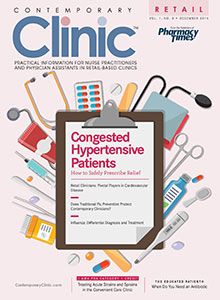Is Psoriasis Severity Linked to Vascular Inflammation?
The National Psoriasis Foundation reports that as many as 7.5 million Americans suffer from psoriasis, an autoimmune inflammatory disease.
The National Psoriasis Foundation reports that as many as 7.5 million Americans suffer from psoriasis, an autoimmune inflammatory disease. The disease often carries with it a burden of quality-of-life impairment. Psoriasis has been linked to sometimes fatal cardiovascular complications in recent years. In fact, research published in theJournal of the American Heart Associationhas shown that mild and severe psoriasis are associated with increased risk of myocardial infarction and stroke, with severe psoriasis also increasing the risk of cardiovascular mortality.
A recent study published inArteriosclerosis, Thrombosis, and Vascular Biologyset out to determine the relationship between vascular inflammation, a risk factor for cardiovascular disease, and psoriasis severity using18F-fluorodeoxyglucose positron emission tomography. The study results revealed that participants who had psoriasis had increased arterial inflammation versus controls with a target-to-background ratio of 1.8 and 1.6, respectively.
Psoriasis severity was shown to have a statistically significant link to vascular inflammation: the more severe the disease, the more inflammation. In addition, cytokines and neutrophils were found in increased concentrations in patients with psoriasis compared with controls.
The results from this study show that with increased psoriasis severity comes increased inflammation, which may lead to cardiovascular morbidity and mortality. This may be due to a shared immune-mediated mechanism.
Inflammatory mediators produced by psoriatic plaques can reach systemic circulation, thereby affecting surrounding tissues and leading to vascular inflammation and atherosclerotic disease. Further studies should help determine whether treating psoriasis decreases vascular inflammation.

